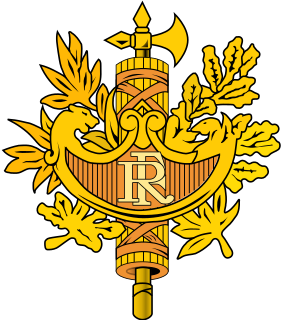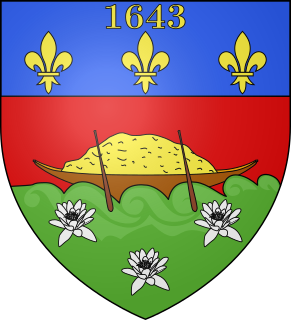
French Guiana is not a separate territory but is both an overseas région and overseas department of France, with the same government institutions as areas on the French mainland. The administrative center is Cayenne.

Cher is a department in the Centre-Val de Loire region of France. It is named after the Cher River.

The regions of Italy are the first-level constituent entities of the Italian Republic, constituting its second NUTS administrative level. There are 20 regions, of which five have a broader amount of autonomy than the other 15 regions. Under the Italian Constitution, each region is an autonomous entity with defined powers. With the exception of the Aosta Valley, each region is divided into a number of provinces.

The Conseil de l'Entente is a West African regional co-operation forum established in May 1959 by Ivory Coast, Niger, Upper Volta and Dahomey, and joined in 1966 by Togo.
The overseas departments and regions of France are departments of France which are outside metropolitan France, the European part of France. They have nearly the same political status as metropolitan departments, although special constitutional provisions allow them greater autonomy and they are excluded from certain domestic statistics, such as the unemployment rate.

The Parliament of Wallonia is the legislative body of Wallonia, one of the three self-governing regions of Belgium. The parliament building, the former Hospice Saint-Gilles, is situated in Namur, the capital of Wallonia, at the symbolic confluence of the Meuse and the Sambre, the two main rivers of the most inhabited parts of Wallonia, the Sillon industriel. On the other side of the Meuse, facing the Parliament, is the Élysette, the seat of the Walloon government.

The United Nations Human Rights Council is a United Nations body whose mission is to promote and protect human rights around the world. The UNHRC has 47 members elected for staggered three-year terms on a regional group basis. The headquarters of UNHRC is in Geneva, Switzerland.
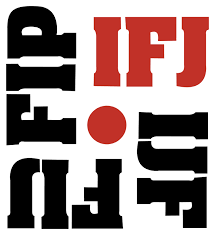
The International Federation of Journalists (IFJ) is a global union federation of journalists' trade unions—the largest in the world. It represents more than 600 000 media workers from 187 organisations in 146 countries.
An administrative center is a seat of regional administration or local government, or a county town, or the place where the central administration of a commune is located.
A municipal council is the legislative body of a municipality such as a city council or a town council.
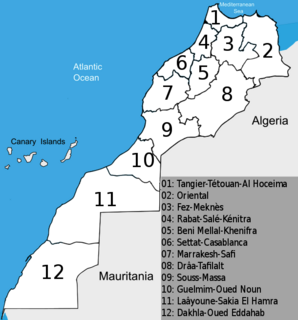
Regions are currently the highest administrative divisions in Morocco. Since 2015, Morocco officially administers 12 regions, including one that lies completely within the disputed territory of Western Sahara and two that lie partially within it. The regions are subdivided into a total of 75 second-order administrative divisions, which are prefectures and provinces.

The Territory of the Saar Basin was a region of Germany occupied and governed by the United Kingdom and France from 1920 to 1935 under a League of Nations mandate. It had its own flag : a blue, white, and black horizontal tricolour. The blue and white stood for Bavaria, and white and black for Prussia, out of whose lands the Saar Territory was formed. Initially, the occupation was under the auspices of the Treaty of Versailles. Its population in 1933 was 812,000, and its capital was Saarbrücken. The territory closely corresponds with the modern German state of Saarland, but was slightly smaller in area. After a plebiscite was held in 1935, it was returned to Germany.

United Cities and Local Governments (UCLG); French: Cités et Gouvernements Locaux Unis (CGLU); Spanish: Ciudades y Gobiernos Locales Unidos (CGLU); is an umbrella organisation for cities, local and regional governments, and municipal associations throughout the world. United Cities and Local Governments was founded in 2004, when the existing local government organisations - the International Union of Local Authorities (IULA) and the United Towns Organisations (UTO) – united their respective global networks of cities and national associations of local governments in a single organisation. United Cities and Local Governments' headquarters, the World Secretariat, is based in Barcelona, Spain. UCLG is the largest organization of sub-national governments in the world, with over 240,000 members in over 140 UN Member States and understands itself as the united voice and world advocate of democratic local self-government, de facto representing over half the world's population, the cities and association members of UCLG are present in over 120 UN Member States across seven world regions: The organization's activities include hosting meetings of mayors and other local and regional leaders, advocacy for the interests of local and regional governments at the UN, and international peer-to-peer training on local policies and practices.

An international organization is an organization established by a treaty or other instrument governed by international law and possessing its own international legal personality, such as the United Nations, the World Health Organization and NATO. International organizations are composed of primarily Member states, but may also include other entities, such as other international organizations. Additionally, entities may hold observer status.

The permanent members of the United Nations Security Council are the five states which the UN Charter of 1945 grants a permanent seat on the UN Security Council: China, France, Russia, the United Kingdom, and the United States. These countries were all allies in World War II, which turned out victorious. They are also all nuclear weapons states. A total of 15 UN member states serve on the UNSC, the remainder of which are elected. Any one of the five permanent members have the power of veto, which enables them to prevent the adoption of any "substantive" draft Council resolution, regardless of its level of international support.

Grand Est is an administrative region in northeastern France. It superseded three former administrative regions—Alsace, Champagne-Ardenne, and Lorraine—on 1 January 2016 under the provisional name of Alsace-Champagne-Ardenne-Lorraine, as a result of territorial reform which had been passed by the French legislature back in 2014.

Bourgogne-Franche-Comté, sometimes abbreviated BFC, is a region in the east of France created by the territorial reform of French Regions in 2014, from a merger of Burgundy and Franche-Comté. The new region came into existence on 1 January 2016, after the regional elections of December 2015, electing 100 members to the regional council of Bourgogne-Franche-Comté.
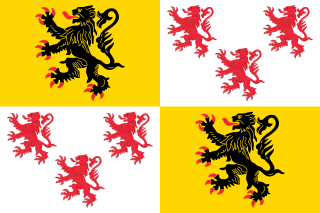
Hauts-de-France is the northernmost region of France, created by the territorial reform of French Regions in 2014, from a merger of Nord-Pas-de-Calais and Picardy. Its capital is Lille. The new region came into existence on 1 January 2016, after the regional elections in December 2015. France's Conseil d'État approved Hauts-de-France as the name of the region on 28 September 2016, effective 30 September 2016.
















